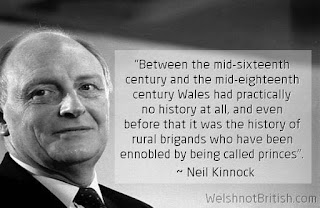Don't listen to kinnock, they were as princely as any other.
The picture below has been flying around social media for a few years now.
Kinnock said these words while trying to tell the Welsh that they have no right of nationhood or an assembly during the 1979 referendum campaign.
The thing is though, folks, he isn't alone with these opinions. Many people of his generation have this opinion. They grew up at a time when many people were embarrassed of being welsh.
A time when the print media and the BBC have full control over what news the people had access to.
Anyway, I thought I would have a look to see what the differences are between the Welsh princes and so-called Brigands.
Iv decided to compare well-known brigands called the Red Bandits of Mawddwy and the Welsh prince who was called Llywelyn ap Iorwerth.
I'm not going to go in depth here as I'm only comparing them :)
When Llewellyn becomes prince, deliberately set out on a policy of reconstructing the whole basis of Welsh political life. He created charters and done all he could to create stability.
(could Neil tell me what brigands have created charters and tried to stabilise a nation that's been at war for a number of centuries? )
Llywelyn soon established himself as the leader of the other princes of Wales, and in December 1215, led an army which included all the lesser princes to capture the castles of Carmarthen, Kidwelly, Llanstephan, Cardigan Cilgerran Deganwy and Rhuddlan.
He had a very successful military career, fighting a number of battles and leading armies of over 10,000 strong at times.
He funded grand religious buildings and built a number of stone castles which include
(did brigands build abbeys and castles?)
see pictures below.
Llywelyn managed to marry Joan, who was the daughter of King John, in 1205.
(i don't think the king of England would allow his daughter to marry a brigand. do you? )
Llywelyn possessed crowns and other precious things which included a
sacred relic believed to be a fragment of the True Cross called Y Groes Naid which was believed to be a fragment of the True Cross which had been kept at Aberconwy by the kings and princes of Gwynedd,
(brigands would have sold such things obviously)
There are nice statues of Llywelyn :)
Stone carvings of his head have been found.
He also had a fancy coffin.
and seals.
So there is a Welsh prince that Kinnock called a brigand.
Lets have a look at what he meant by brigands.
this is what Google has to say when you type in the word brigand.
brigand
ˈbrɪɡ(ə)nd/
noun
plural noun: brigands
- a member of a gang that ambushes and robs people in forests and mountains.
The red bandits of mawddwy were in many ways the perfect gang of brigands.
This is what wiki has to say about them.
Red Bandits of Mawddwy
The Red Bandits of Mawddwy (Welsh: Gwylliaid Cochion Mawddwy) were a band of red-haired robbers, highwaymen or footpads from the area of Mawddwy in Mid Wales in the 16th century, who became famous in folk literature.
The bandits were mostly violent and vicious criminals that came from many parts of Wales to the area of Dinas Mawddwy.
The area of Mawddwy was situated on the boundary between the Welsh Marches and Meirionnydd . An area that was for a number of reasons considered 'lawless'
they murdered the Sheriff of Meirionnydd, 12 October 1555. The attack was carried out by a group of bandits near Dinas Mawddwy. Several of the bandits were hanged for the murder.
Brigands live outside the law, rob and kill to make money.
welsh princes created the law. It was men appointed by many princes that would hang brigands when caught.
Welsh princes lived in castles or royal courts. They had crowns, land, power, they led armies of many thousands of subjects into war, They built churches and abbeys and other religious buildings
Some would be received in Rome by the serving pope as the royalty they were. Llywelyn above was even supported by the pope in one of his wars against the English.
Today, many of us who support independence for wales look upon our princes with pride. They are examples of a people that held out against invaders many times and often against massive odds. The likes of Kinnock don't like this. They want to strip the Welsh on any notion of nationhood. To them, the 'union' is all they need. They hate anyone showing confidence in their Welsh identity, so will do all they can to put wales down to counter this confidence. They see it as a threat. Just as they see welsh history and the tales of our princes as a threat.
We know the truth, though, don't we? The Welsh princes were as princely as any other and deserved to be remembered as such.









Comments
Post a Comment